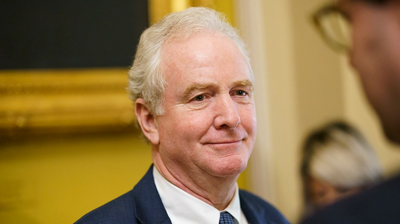
Sen. Chris Van Hollen (D-Md.) on Sunday called for "consequences" on Israel in an effort to reduce civilian deaths and allow greater humanitarian aid into Gaza.
Asked on CBS News's "Face the Nation" if the Israeli government needs to face consequences if they are contributing to blocking aid into Gaza for political reasons, Van Hollen said, "Yes, I do think there ... have to be consequences."
"And you know, [Secretary of State Antony Blinken] and President Biden had been right to insist on two things: a reduction in the unacceptable levels of civilian casualties, and much more cooperation when it comes to providing humanitarian assistance. We've not seen that," Van Hollen added.
Van Hollen, alongside Sen. Jeff Merkley (D-Ore.), spent the past few days in the Middle East where they visited the Rafah border crossing between Egypt and Gaza. The crossing is how most humanitarian aid gets into besieged Gaza, though several humanitarian organizations have stressed the aid is a fraction of what is needed for civilians.
Van Hollen suggested aid is not getting into the region because of a political choice by Israeli Prime Minister Benjamin Netanyahu.
"There are two big things that are happening. One is the unnecessarily cumbersome process, going through the Israeli screening process, which I believe is the result of political decisions by the Netanyahu coalition," he said.
Van Hollen said items such as water filtration systems were found rejected at a warehouse, and explained how he watched trucks with aid from UNICEF be turned away at the crossing.
"And when one item on a truck is rejected, the entire truck is rejected," he said. The other big issue is within Gaza, the so-called deconfliction process, which is just a fancy name for those who are providing humanitarian assistance to have the confidence that they can deliver it without being killed."
"And according to all the international [nongovernmental organizations] that we talked about who have been operating in conflict zones around the world, they've never seen a worse process for assuring the safe delivery of humanitarian assistance," he added.
CBS "Face the Nation" moderator Margaret Brennan noted France and Jordan decided to airdrop aid into Gaza due to the issues on land. Asked if the U.S. should do the same, Van Hollen said, "Well, I think we should consider every means to try to get desperately needed humanitarian assistance into Gaza," while noting airports are not at scale.
The war between Israel and the militant group Hamas has raged on for more than three months following Hamas's Oct. 7 attack that left an estimated 1,200 people dead. About 240 people were believed to have been kidnapped by Hamas during the attack.
The Gaza Health Ministry, which is run by Hamas, said Sunday at least 22,835 people have been killed in the coastal enclave since early October, according to reports.
U.S. officials have increased pressure on Israel in recent weeks to allow greater amounts of aid to travel into the region while stressing that Israel has the right to defend itself. Still, the Biden administration has publicly and behind the scenes urged Israel to scale down the war and be more mindful of civilian deaths.
The United Nations Security Council last month passed a resolution to scale up assistance to the Gaza Strip. The U.S. did not vote in favor of the resolution, but also did not block it.
Israel last month opened its Kerem Shalom crossing into Gaza, creating a second entry point for aid, The Associated Press reported.